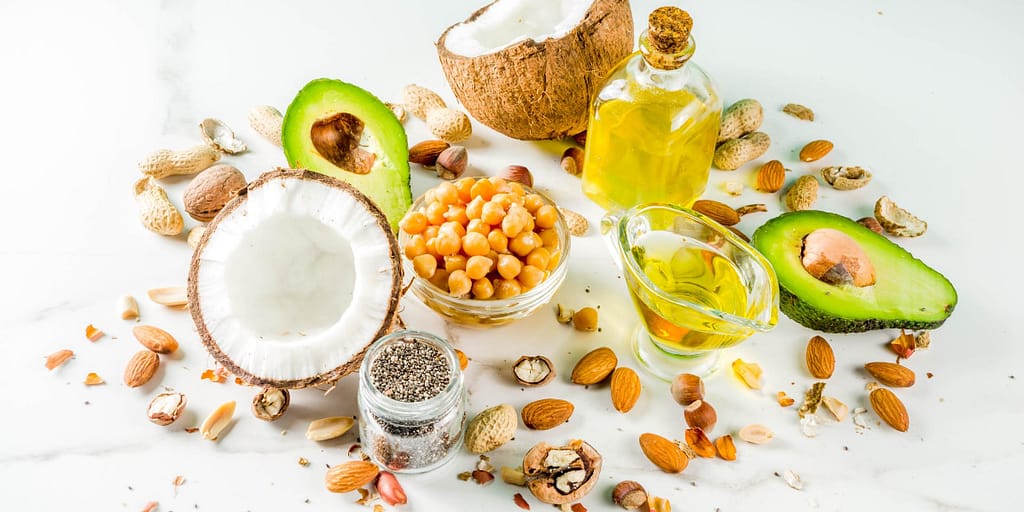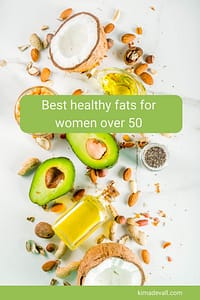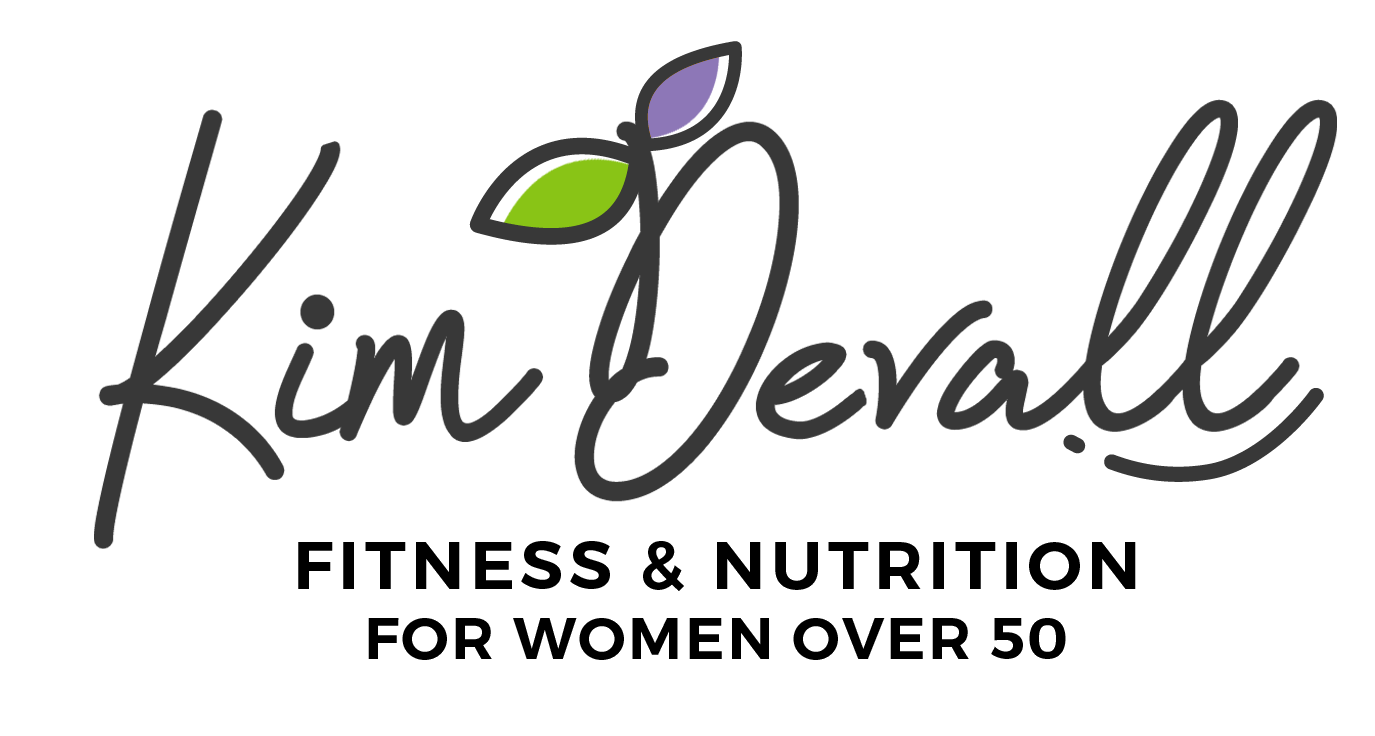What are the best healthy fats for women over 50?
If you’re approaching or over 50, you may be noticing extra weight gain or stubborn fat that just won’t go away. Sound familiar?
Can you lose weight eating fat? What are the different types of fats? Does eating fat make us fat? What fats should you eat more of?

Healthy fats are an essential part of our diets. Fat was really demonized back in the 80’s. The craze was all about fat-free everything. I still remember thinking I could eat all the Snackwell cookies I wanted because they were FAT-FREE!
We’ve learned a lot over the years and yet it can still be confusing.
In this blog, I cover all you want to know about healthy and unhealthy fats so you can lose weight, have more energy, be healthier and LOVE your body.
New here? Thanks for stopping by. After you read this post, check out my other blogs for the woman over 50 who wants to lose body fat while building muscle and eating foods you actually want to eat.
- Secrets to losing weight with walking routine
- How to easily start reducing your calories today
- 5 Reasons you want to start counting macros today
- 8 reasons you should stop dieting to lose weight
- Use this time to create your at-home fitness routine
- 5 Reasons you want to start increasing your physical activity today
- Effective steps to reverse the creeping weight gain
What are the types of fats? Healthy vs Unhealthy Fats
Healthy Fats
The American Heart Association recommends that most of the fat we eat be polyunsaturated or monounsaturated fats; therefore, these are the best healthy fats for women over 50 too.
All foods with fat have more than one type of fat.
What are polyunsaturated fats?
Without being overly technical, a polyunsaturated fat is a fat molecule with more than one unsaturated carbon bond. Oils with polyunsaturated fat tend to be liquid at room temperature.
Polyunsaturated fats are essential fats your body needs and cannot produce. You must get these from the foods you eat.
What are the two types of polyunsaturated fats?
There are 2 types of polyunsaturated fats that are considered essential fats (ie. our body needs and cannot produce.) As mentioned above, these fats must come from the food you eat.
- Omega-3 fats are important for brain, nerve and eye development in infants. They also help to strengthen our immune system and may lower the risk of heart disease and stroke.
- Omega-6 fats also support our immune system and are important for blood clotting. Some research indicates omega-6 may help with rheumatoid arthritis and dermatitis; however, more research is needed.
What are monounsaturated fats?
Monounsaturated fat is a fat molecule with one unsaturated carbon bond.
Like polyunsaturated fats, monounsaturated fats are essential fats your body needs and cannot produce. You must get these from the foods you eat. They are also liquid at room temperature and can come from plant and animal sources.
Monounsaturated fats can help lower LDL “bad” cholesterol, which helps lower your risk for heart disease and stroke.
And now, let’s dive in to those unhealthy fats. The ones you definitely want to eat in moderation (saturated fats) or not at all (trans fats).
Unhealthy Fats
A diet high in Saturated Fats has been shown to increase risk of heart disease and raise cholesterol. Our goal should be to keep saturated fat intake low. The American Heart Association recommends keeping saturated fat below 10% of total calories.
Trans Fats can be found in natural and artificial forms. They naturally can occur in meat and dairy. Natural forms of trans fats are believed to be safe and may even be beneficial.
Artificial Trans Fats are the worst type of fat. There are no health benefits and there is no safe limit of consumption. These are considered hazardous to your health.
Most trans fats are the result of a process called hydrogenation. This process was created to turn healthy oils into solids so they would last longer. They have been banned in the US due to increased risk of heart disease, diabetes and stroke.
Best Healthy Fats for Women Over 50
Below is a quick reference comparison of foods high in healthy fats.
Healthy Fats from Oils
Extra Virgin Olive Oil
- Serving size – 1T
- Calories per serving – 120
- Total Fat -14g
- Monounsaturated Fat – 10g (71% of fat)
- Polyunsaturated Fat – 1.8g
- Saturated Fat – 2.2
Canola Oil
- Serving size – 1T
- Calories per serving – 120
- Total Fat – 14g
- Monounsaturated Fat – 8g (57% of fat)
- Polyunsaturated Fat – 3.6g
- Saturated Fat – 1.1g
- Trans Fat -.2g
Healthy Fats from Nuts
Walnuts
- Serving size – 1 ounce/approx 14 halves
- Calories per serving- 185
- Total Fat – 18g
- Monounsaturated Fat – 2.5g
- Polyunsaturated Fat – 13.5g (75% of fat)
- Saturated Fat – 1.7g
Almonds
- Serving size – 1 ounce/approx23 almonds
- Calories per serving- 165
- Total Fat – 14g
- Monounsaturated Fat – 11g (80% of fat)
- Polyunsaturated Fat – 2g
- Saturated Fat – .7g
Healthy Fats from Nut Butters
Almond Butter
- Serving size -2T
- Calories per serving – 198
- Monounsaturated Fat – 10g
- Polyunsaturated Fat – 4.4g
- Saturated Fat – 1.4g
Peanut Butter
- Serving size -2T
- Calories per serving – 188
- Monounsaturated Fat – 8g
- Polyunsaturated Fat – 4.4g
- Saturated Fat – 3.3g
Healthy Fats from Fish
Wild Salmon
- Serving size -155 grams or appox 5.5 ounces
- Calories per serving – 261
- Total Fat – 10g
- Monounsaturated Fat – 2.2g (22% of fat)
- Polyunsaturated Fat – 2.3g (23% of fat)
- Saturated Fat – 1.4g
Mackerel
- Serving size -136 grams or appox 5 ounces
- Calories per serving – 415
- Total Fat – 34g
- Monounsaturated Fat – 11g (32% of fat)
- Polyunsaturated Fat – 8g (24% of fat)
- Saturated Fat – 10g
Healthy Fats from Seeds
Sunflower Seeds
- Serving size -1 ounce
- Calories per serving – 166
- Total Fat – 14.5g
- Monounsaturated Fat – 5.3g (37% of fat)
- Polyunsaturated Fat – 6.5g (45% of fat)
- Saturated Fat – 1.2g
Pumpkin Seeds
- Serving size -1 ounce
- Calories per serving – 126
- Total Fat – 5g
- Monounsaturated Fat – 1.7g (34% of fat)
- Polyunsaturated Fat – 2.7g (54% of fat)
- Saturated Fat – 1g
Healthy Fats from 2 other Popular Foods
Regular Whole Egg
- Serving size -2 large eggs
- Calories per serving – 156
- Total Fat – 10g
- Monounsaturated Fat – 4g (40% of fat)
- Polyunsaturated Fat – 1.4g
- Saturated Fat – 3.2g
Avocado
- Serving size – 1/3 avocado; approx 50 grams
- Calories per serving – 80
- Total Fat – 7g
- Monounsaturated Fat – 4.8g (69% of fat)
- Polyunsaturated Fat – .9g
- Saturated Fat – 1g
How much fat should a woman over 50 eat ...
To Lose Weight?
Some studies have shown that diets high in monounsaturated fat have been effective with weight loss. Keeping your total calories at a healthy level, consider increasing your monounsaturated fats to 20% of total calories.
In other words, if you’re eating 1500 calories per day, you would want to consume 33 grams of monounsaturated fat, while keeping total fat below 58 grams.
To Gain Muscle?
Your body uses fat to provide energy during strength training. As a guideline, you should eat between 20 – 35% of your total calories in fat, with 10% or less in saturated fats.
Side note: If you’re looking to build muscle, you may be interested in my FREE 7-day at-home workout plan.
For more tips on meal planning so that your protein and carbohydrates are also within healthy guidelines, grab my Step-by-Step guide to Planning Healthy Meals you Actually Want to Eat.
What foods are high in unhealthy fats?
Saturated Fats
Saturated fats should be limited to 10% of your total calories. For example, if you’re eating 1500 calories per day, your saturated fat would ideally be 16g or less per day.
The primary sources of saturated fat are:
- Red meat – not all red meat is high in saturated fat.
5 oz ribeye steak packs 76g of saturated fat. Whereas a, 5oz sirloin steak comes in at 8g saturated fat.
- Whole milk – 1c contains approximately 4.6 grams of saturated fat
- Whole fat cheese – 1 oz slice provides approx 5 grams of saturated fat
- Butter – 1T will give you approximately 7 grams of saturated fat
- Ice Cream – 1/2c equates to approximately 4.5 grams of saturated fat. Have you ever measured out a 1/2c of ice cream? It’s not very much!
Side note: you don’t have to avoid saturated fats. However, you do want to eat them in moderation. Like in the example above, it doesn’t take much to add up to the 16g per day.
Trans Fats
Trans fats not only raise LDL “bad” cholersterol, but they also lower HDL “good” cholesterol.
The primary sources of trans fats are:
- commercially-baked cookies
- doughnuts
- muffins
- packaged snack foods, like crackers and chips
- stick margarine
- vegetable shortening
- fried foods, like french fries, fried chicken
Pulling it all together... Best healthy fats for women over 50
- All fats contribute 9 calories per gram so calories quickly add up.
- Total fats should be 20 – 35% of total calories
- Goal is to keep saturated fats at 10% or less of total calories
- Avoid all artificial trans fats
- If you’re consuming 1500 calories per day, ideally your total fat would be 33 – 58 grams, with saturated fat at 17 grams or less.
- Foods high in monounsatured fat are Extra Virgin Olive Oil, Canola Oil, Almonds, Almond Butter, Peanut Butter, Mackerel, Sunflower seeds, Avocados, Eggs
- Foods high in polyunsaturated fat are walnuts, wild salmon, mackerel, sunflower seeds
Following are some of the frequently asked questions I hear most often. If you have addtional questions, be sure to leave a comment or send me a message.
FAQ
Most frequent questions and answers
Yes, it is recommended that you keep total fat to 20 – 35% of total calories with saturated fat at 10% or less. All fats contain 9 calories per gram.
The appropriate number of calories will differ by person. Factors to be considered include your current weight, your activity level, whether you are focusing on losing weight or gaining muscle. In general, most women over 50 would need to consume 1400 – 1800 calories.
Yes, See the section above that refers to the best healthy fats from nut butters. Peanut butter is an excellent source of healthy fats.
Healthy fats provide energy. They are needed to absorb fat-soluable vitamins – A, D, E and K. Healthy fats support a strong immune system, help lower bad cholesterol “LDL” and raise good cholesteral “HDL”, which lowers risk for heart disease and stroke.
No, eating fat will not make you fat. Excess calories from any source, including fats, will cause you to gain weight.
Pin it Now. Read it Later.

